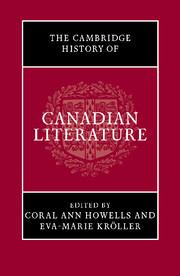Book contents
- Frontmatter
- Introduction
- PART ONE OLD AND NEW WORLD, LA NOUVELLE-FRANCE, THE CANADAS, DOMINION OF CANADA
- 1 Native societies and French colonization
- 2 Reports from la Nouvelle-France: the Jesuit Relations, Marie de l’Incarnation, and Élisabeth Bégon
- 3 Migrations, multiple allegiances, and satirical traditions: from Frances Brooke to Thomas Chandler Haliburton
- 4 Writing in the Northwest: narratives, journals, letters, 1700–1870
- 5 Literature of settlement
- 6 History in English and French, 1832–1898
- PART TWO THE POST-CONFEDERATION PERIOD
- PART THREE MODELS OF MODERNITY, POST-FIRST WORLD WAR
- PART FOUR AESTHETIC EXPERIMENTS, 1960 AND AFTER
- PART FIVE WRITING IN FRENCH
- Bibliography
- Index
- References
3 - Migrations, multiple allegiances, and satirical traditions: from Frances Brooke to Thomas Chandler Haliburton
from PART ONE - OLD AND NEW WORLD, LA NOUVELLE-FRANCE, THE CANADAS, DOMINION OF CANADA
Published online by Cambridge University Press: 28 September 2010
- Frontmatter
- Introduction
- PART ONE OLD AND NEW WORLD, LA NOUVELLE-FRANCE, THE CANADAS, DOMINION OF CANADA
- 1 Native societies and French colonization
- 2 Reports from la Nouvelle-France: the Jesuit Relations, Marie de l’Incarnation, and Élisabeth Bégon
- 3 Migrations, multiple allegiances, and satirical traditions: from Frances Brooke to Thomas Chandler Haliburton
- 4 Writing in the Northwest: narratives, journals, letters, 1700–1870
- 5 Literature of settlement
- 6 History in English and French, 1832–1898
- PART TWO THE POST-CONFEDERATION PERIOD
- PART THREE MODELS OF MODERNITY, POST-FIRST WORLD WAR
- PART FOUR AESTHETIC EXPERIMENTS, 1960 AND AFTER
- PART FIVE WRITING IN FRENCH
- Bibliography
- Index
- References
Summary
At the close of the Seven Years’ War in 1763, which gave England almost total control of the continent of North America until the American Revolution, only a handful of English administered a newly conquered population of 60,000 French Canadians. It has been asserted that this period witnessed “a literature of information rather than a literature of imagination.” It is indeed for its documentary qualities that certain critics appreciate The History of Emily Montague (1769), published in England but nonetheless the earliest novel to emanate from the North American continent. The quality of its descriptions of the Kamouraska region has effectively incited critics to treat it as travel literature. Yet the writer Frances Brooke (1724–89) undeniably reconfigured the topography, institutions, and social interactions of the French and English elites in the newly acquired colony of what is today Quebec, struggling notably, as Susanna Moodie would, with the gap between Old World diction and decorum, and New World landscape – the embodiment of Burkean sublimity.
The History of Emily Montague
Moving in the literary circles of Samuel Richardson, Samuel Johnson, and Fanny Burney, Mrs. Brooke was an established editor, translator, playwright, and novelist (The History of Lady Julia Mandeville, 1763) before leaving England to reside in Quebec City in 1763. As well as a travel book intended for an English readership in search of exotic settings and mores, Emily Montague has been labelled a romance (although almost totally devoid of the conventional melodramatic trappings the genre had adopted), a novel of sentiment, or a novel of manners, and the book has often been reduced to an uneventful love story.
- Type
- Chapter
- Information
- The Cambridge History of Canadian Literature , pp. 47 - 66Publisher: Cambridge University PressPrint publication year: 2009



